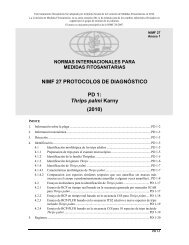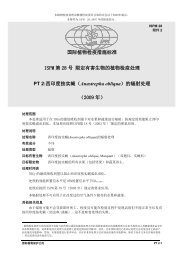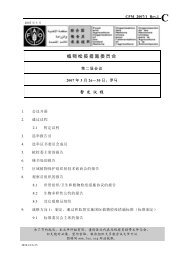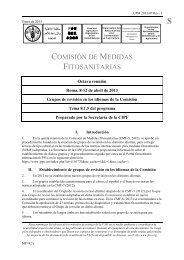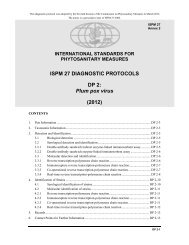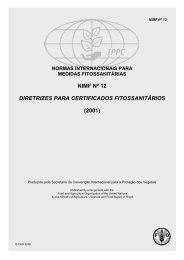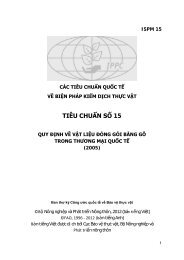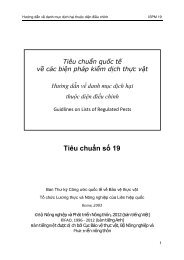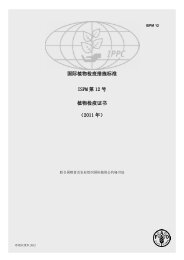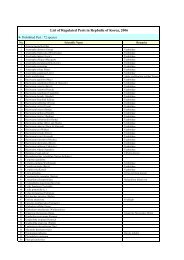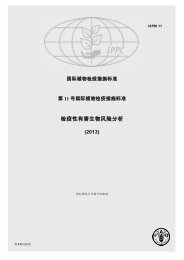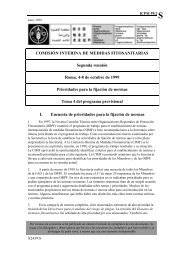Appendix 1: List of Participants, Facilitators and Rapporteurs.
Appendix 1: List of Participants, Facilitators and Rapporteurs.
Appendix 1: List of Participants, Facilitators and Rapporteurs.
You also want an ePaper? Increase the reach of your titles
YUMPU automatically turns print PDFs into web optimized ePapers that Google loves.
<strong>Appendix</strong> 1: <strong>List</strong> <strong>of</strong> <strong>Participants</strong>, <strong>Facilitators</strong> <strong>and</strong> <strong>Rapporteurs</strong>.<br />
PARTICIPANTS<br />
BARBADOS<br />
Mr. Michael Philip<br />
Senior Agricultural Officer<br />
Ministry <strong>of</strong> Agriculture <strong>and</strong> Rural<br />
Development<br />
P.O Box 505<br />
Graeme Hall, Christ Church<br />
Tel No: (246) 428-4150<br />
Fax No: (246) 428-7777<br />
Email: eephilip@caribsurf.com<br />
BELIZE<br />
Mr. Gumercindo Mai<br />
Plant Health Officer<br />
Plant Protection, Belize Agricultural Health<br />
Authority<br />
Central Farm, Cayo District<br />
Belize<br />
Tel: 501-824-4872,4899<br />
Fax: 501-824-3773<br />
Email: maigumers@yahoo.com<br />
GRENADA<br />
Mr. Bertr<strong>and</strong> Munro<br />
Plant Quarantine Officer<br />
Pest Management Unit<br />
Ministry <strong>of</strong> Agriculture<br />
St. George’s<br />
Tel: 473-440-2708<br />
Email:Monami46@hotmail.com<br />
pmu@caribsurf.com<br />
GUYANA<br />
Ms. Constance Victorine Kellman<br />
Technical Manager- Plant Health<br />
Ministry <strong>of</strong> Fisheries,<br />
Crops <strong>and</strong> livestock<br />
Regent <strong>and</strong> New Garden Streets<br />
Georgetown<br />
Tel: (592) 226 7061<br />
Fax: (592) 225 3944<br />
Email: vickyk@networksgy.com<br />
IPPC MEMBERS COUNTRIES<br />
JAMAICA<br />
Mr. Fitzroy White<br />
Senior Plant Quarantine Inspector<br />
Ministry <strong>of</strong> Agriculture<br />
193 Old Hope Road, Kingston,<br />
Tel. No: (876) 977 0637<br />
Fax: (876) 977 6401<br />
Email: fswhite@moa.gov.jm<br />
ST. KITTS & NEVIS<br />
Mr. Paul Benjamin<br />
Agronomist<br />
Department <strong>of</strong> Agriculture<br />
P.O. Box 39 Basseterre<br />
St. Kitts<br />
Tel: 869-465-2335<br />
Fax: 869-465-2928<br />
Email: Paanben@hotmail.com<br />
doastk@caribsurf.com<br />
ST. LUCIA<br />
Mr. Gregory Squires<br />
Crop Protection Officer<br />
Crop Protection & Quarantine Unit<br />
Ministry <strong>of</strong> Agriculture, Fisheries &<br />
Forestry<br />
Waterfront, Castries<br />
Tel: 1-758-452-2526/450-2375<br />
Fax: 1-758-450-1185<br />
Email: pegsqu@yahoo.com<br />
ST. VINCENT & THE GRENADINES<br />
Mr. Marcus Richards<br />
Agricultural Officer<br />
Ministry <strong>of</strong> Agriculture Forestry &<br />
Fisheries<br />
Richmond Hill, Kingstown<br />
Tel No: (784) 456 1410 / 457 1283<br />
Fax: (784) 457 1688<br />
Email: mlrids@yahoo.com<br />
<strong>of</strong>fice.agriculture@mail.gov.vc
TRINIDAD AND TOBAGO<br />
Dr. Lilory McComie<br />
Deputy Director, Research Crops<br />
Research Division<br />
Central Experiment Station, Centeno<br />
Ministry <strong>of</strong> Agriculture, L<strong>and</strong> <strong>and</strong> Marine<br />
Resources<br />
Phone: (868) 642 6008<br />
Fax: (868) 646 2149/1645<br />
Email: lilory@tstt.net.tt<br />
ANTIGUA & BARBUDA<br />
Mrs. Maud Vere Bradford<br />
Plant Protection Officer(Ag.)<br />
Ministry <strong>of</strong> Agriculture, L<strong>and</strong>s, Marine<br />
Resources & Agro Industries<br />
Plant Protection Unit,<br />
Queen Elizabeth Highway<br />
St. John’s, Antigua<br />
Tel No: (268) 462 1213<br />
Fax: (268) 462 4962<br />
Email: plantprotection@antigua.gov.ag<br />
CAYMAN ISLANDS<br />
Ms. Joan Steer<br />
Plant Protection Officer<br />
Department <strong>of</strong> Agriculture<br />
181 Lottery Road, Lower Valley<br />
P.O. Box 459 GT Gr<strong>and</strong> Cayman Isl<strong>and</strong>s<br />
Tel: 1-345-947-3090<br />
Fax: 1-345-947-6501<br />
Email: joan.steer@gov.ky<br />
NON-MEMBER COUNTRIES<br />
TRINIDAD AND TOBAGO<br />
Ms. Anjanie Ramlogan<br />
Agricultural Officer<br />
Research Division<br />
Central Experiment Station, Centeno<br />
Ministry <strong>of</strong> Agriculture, L<strong>and</strong> <strong>and</strong> Marine<br />
Resources<br />
Phone: (868) 646 4334/7<br />
Fax: (868) 646 4335<br />
Email: minfpmrenquirypoint@tstt.net.tt<br />
DOMINICA<br />
Mr. Ryan Anselm<br />
Plant Protection & Quarantine Officer<br />
Plant Protection & Quarantine Services<br />
Ministry <strong>of</strong> Agriculture<br />
Botanical Gardens, Roseau<br />
Commonwealth <strong>of</strong> Dominica<br />
Tel: 1-767-448-2401ext. 3803/3820<br />
Fax: 1-767-448-8632<br />
Email: anselm26@yahoo.com/<br />
agriquarantine@marpin.dm
OBSERVER<br />
BARBADOS<br />
Ms. Carol Thomas<br />
Regional Agricultural Health <strong>and</strong> Food<br />
Safety Specialist<br />
The Inter-American Institute for<br />
Cooperation on Agriculture<br />
Barbados<br />
Tel: 246-427-4740<br />
Fax: 246-429-3509<br />
Email: car_yt@yahoo.com<br />
RAPPORTEURS<br />
TRINIDAD AND TOBAGO<br />
Ms. Helen Mc Connie<br />
Agricultural Officer I<br />
Research Division<br />
Central Experiment Station, Centeno<br />
Ministry <strong>of</strong> Agriculture, L<strong>and</strong> <strong>and</strong> Marine<br />
Resources<br />
Phone: (868) 646 1645<br />
Fax: (868) 646 2149<br />
Email:<br />
FACILITATORS<br />
ITALY<br />
Mr. Jan Breithaupt (PRESENTER)<br />
International Plant Protection Convention<br />
Secretariat (IPPC),<br />
Food <strong>and</strong> Agriculture Organization <strong>of</strong> the<br />
United Nations (FAO / AGPP),<br />
Viale delle Terme di Caracalla,<br />
00100 Rome, Italy<br />
Tel.: +(39) 06 570-53955<br />
Fax: +(39) 06-570-54819<br />
Fax: +(39) 06-570-56347<br />
Email: janBeithaupt@fao.org<br />
Website: www.ippc.int<br />
TRINIDAD AND TOBAGO<br />
Mr. Wayne De Chi<br />
Agricultural Health Specialist<br />
Inter-American Institute for Cooperation<br />
On Agriculture (IICA)<br />
3 Herbert St. Newtown<br />
P.O. 1318, Port <strong>of</strong> Spain<br />
Tel. No: (868) 628 4403/4078<br />
Fax: (868) 628 4562<br />
Email: wdechi@iicacarc.org<br />
TRINIDAD AND TOBAGO<br />
Ms. Kay Parkinson<br />
Agricultural Officer I<br />
Research Division<br />
Central Experiment Station, Centeno<br />
Ministry <strong>of</strong> Agriculture, L<strong>and</strong> <strong>and</strong> Marine<br />
Resources<br />
Phone: (868) 646 4334<br />
Fax: (868) 646 2149<br />
Email: kayalice@hotmail.com<br />
COSTA RICA<br />
Mrs. Maureen Ob<strong>and</strong>o<br />
Administrative Assistant<br />
Agricultural Health <strong>and</strong> Food Safety<br />
Inter-American Institute for Cooperation on<br />
Agriculture (IICA)<br />
Headquarters<br />
Tel: 506-216-0184<br />
Fax: 506-216-0173<br />
Email: maureen.ob<strong>and</strong>o@iica.int
<strong>Appendix</strong> 2: Workshop Program<br />
Date Time Activity Responsibility <strong>and</strong> Documents needed<br />
1st day<br />
Session I: Opening<br />
Chair: Host institution - IICA-Sanidad Agropecuaria e Inocuidad de los Alimentos Maureen Ob<strong>and</strong>o<br />
09:30-10:00 Registration all participants<br />
10:00-10:15 Opening: Host institution <strong>and</strong> / or RPPO MO (IICA)<br />
10:15-10:25 Opening: FAO / IPPC Jan Breithaupt (JB) (FAO-IPPC)<br />
10:25-10:30 Organizational announcements, IICA<br />
Nomination <strong>of</strong> a WS Rapporteur, Chair for Sessions IV+V<br />
Tea/C<strong>of</strong>fee<br />
Session II: Introduction to Workshop Programme on Information Exchange Capacity Building<br />
Chair: Host institution<br />
10:45-11:15 Introduction <strong>of</strong> <strong>Participants</strong> (incl. brief summary <strong>of</strong> experience with using the IPP)<br />
11:15-11:30<br />
Presentation <strong>of</strong> the workshop programme ( IPPC ) – Adoption <strong>of</strong> Agenda<br />
all participants (max. 2 minutes/person)<br />
JB: WS Agenda, (H<strong>and</strong>out no.1 = HO 1)<br />
11:30-11:45 Workshop Objectives <strong>and</strong> expected Outputs ( IPPC ) JB (ref. to IPP Workplan 2005)<br />
11:45-12:30 Introduction to information exchange under the IPPC<br />
JB: IPPC Flowcharts (HO 4),<br />
Lunch PowerPoint (HO 5/1), (ref. Support Group rep.)<br />
Session III: Country Reports on National Information Exchange processes within the IPPC Framework<br />
Chair: IPPC Secretariat<br />
14:00-17:00 Country Presentations on National Information Exchange Processes<br />
-> incl. Pros- <strong>and</strong> cons about using the IPP in each WS-participating country<br />
2nd day<br />
Session IV: Reporting obligations under the IPPC<br />
Chair:<br />
09:00-10:00 Role <strong>of</strong> IPPC <strong>of</strong>ficial contact points ( IPPC Secretariat ) &<br />
NPPO information exchange obligations (IPPC Secretariat & RPPO),<br />
-> Using the IPP to meet Reporting Obligations<br />
10:00-10:30<br />
10:45-11:15<br />
11:20-12:00<br />
Official versus Scientific information<br />
( How does the SPS-notification system fit into this? )<br />
Introduction to- <strong>and</strong> Demonstration <strong>of</strong> the IPP ( IPPC Secretariat )<br />
All workshop participants: max. 10 minutes<br />
presentation per country (e.g. PowerPoints);<br />
Open discussion<br />
JB: IPPC-Strategic Direction 2 (HO2 & 3)<br />
PowerPoint (HO 5/1)<br />
JB: PowerPoint (HO 5/2 & HO 8);<br />
<strong>List</strong> <strong>of</strong> NPPOs <strong>and</strong> RPPOs (HO 9)<br />
JB: PowerPoint (HO 5/3)<br />
( PowerPoint SPS Agreement (HO 5/4) )<br />
Introduction to the IPP -> Background information on the IPP JB: online; IPPC/IPP Brochure<br />
Lunch
Session V: Introduction to the IPP<br />
Chair:<br />
13:45-14:15<br />
i. Purpose <strong>of</strong> the IPP<br />
ii. Layout <strong>of</strong> the IPP<br />
iii. Retrieving information<br />
iv. Data entry<br />
IPP User Guide (HO 6); ISPMs<br />
"<br />
"<br />
Data Entry forms-Templates (HO 7)<br />
Session VI: Practical Sessions ( I )<br />
14:15-17:00 IPP Navigation & Practical exercises<br />
i. NPPO contact points<br />
JB: online, IPP User Guide (HO 6)<br />
CD-ROMs<br />
ii. NPPO information NPPO lists<br />
iii. St<strong>and</strong>ards ISPMs<br />
iv. News online, IPP User Guide<br />
v. Events online, IPP User Guide<br />
vi. RPPO information RPPO lists<br />
vii. Meeting papers/reports online, IPP User Guide<br />
viii. Search<br />
ix. Advanced search<br />
online, IPP User Guide<br />
Demonstration <strong>of</strong> how to find answers to given Navigation exercises...<br />
Conclusion: reflection on key learning points from Day 2<br />
Questions to practical Navigation exercises<br />
3rd day<br />
Session VII: Practical Sessions ( II )<br />
09:00-09:30 Summary on retrieving information - Questions-answers - discussion JB<br />
10:00-12:30 Data entry – Preparation <strong>of</strong> information for entry into the IPP using templates JB<br />
14:00-17:00 Data entry Data Entry forms/<br />
Reporting Obligations (for NPPOs): Templates (HO 7)<br />
1. Pest reports (Articles IV 2(b) & VIII 1(a)); New revised Text (NRT: HO 2)<br />
2. Description <strong>of</strong> the NPPOs (Article IV 4); IPP User Guide (Help manual: HO 6)<br />
3. Phytosanitary restrictions, requirements <strong>and</strong> prohibitions (Article VII 2(b));<br />
4. Points <strong>of</strong> entry with specific restrictions (Article VII 2(d));<br />
5. <strong>List</strong> <strong>of</strong> regulated pest (Article VII 2(i));<br />
6. Emergency actions (Article VII 6);<br />
7. Official contact points (Article VIII 2)<br />
Conclusion: reflection on key learning points from Day 3
4th day<br />
Session VIII: Practical Sessions continued ( III )<br />
09:00-09:30 Summary on data entry - Questions-answers – discussion JB<br />
10:00-12.30 Data entry <strong>and</strong> navigation<br />
Data entry templates (HO 7)<br />
open discussion...<br />
Session IX: Practical Sessions continued ( IV )<br />
14:00-16:00 Presentations <strong>of</strong> data added by country to the IPP<br />
16:00-17:00 Open discussion: Questions-answers etc. & Workshop Evaluation Form<br />
Conclusion: reflection on key learning points from Day 4<br />
5th day<br />
Session X: Closing<br />
Chair: Host institution<br />
online<br />
Workshop evaluation form (HO 10)<br />
09:00-09:30 Workshop evaluation Workshop Evaluation form (HO 10)<br />
09:30-11.00 Adoption <strong>of</strong> the report<br />
Closing remarks<br />
IPPC representative JB<br />
-12:00 RPPO representative MO / IICA
APPENDIX 3: Country Reports<br />
________________________________________________________<br />
ST. KITTS AND NEVIS<br />
IPP Training Workshop<br />
Description <strong>of</strong> NPPO <strong>and</strong> changes<br />
!<br />
"<br />
# $ !% & '<br />
<strong>List</strong> <strong>of</strong> regulated pest<br />
+<br />
, ! -<br />
. # ' /<br />
&0" , 1 !<br />
- # / /1<br />
Official Contact Point<br />
Non- compliance<br />
( '<br />
) *<br />
2<br />
Pest Reporting<br />
1 ' "1
Exchange <strong>of</strong> information on plant<br />
pests, particularly the reporting <strong>of</strong><br />
the occurrence, outbreak or spread<br />
1 ' "1<br />
2<br />
1 !<br />
' "1<br />
3<br />
Specified Points <strong>of</strong> Entry<br />
'<br />
' 4<br />
! "<br />
'<br />
%<br />
' 4<br />
! " 4 "<br />
$ %<br />
5 ! 1<br />
2<br />
Emergency Action<br />
Phytosanitary requirements<br />
! ' "<br />
% '' '<br />
7 "<br />
$ " !<br />
"<br />
Technical <strong>and</strong> biological<br />
information necessary for Pest Risk<br />
Analysis (PRA)<br />
+ " ! 1<br />
'' !<br />
$ #$ '<br />
Organizational arrangements for<br />
plant protection<br />
# ' '<br />
# ' '<br />
# '<br />
- &1 ' 4<br />
' 1 - # / /1<br />
. ' /<br />
$ " % $<br />
1<br />
$ " % $ . # ##$<br />
# ' '<br />
Phytosanitary requirements,<br />
restrictions <strong>and</strong> prohibitions<br />
$ "<br />
' ! '<br />
" ' '<br />
! % ! 6<br />
4 7 4 8 4<br />
" 4, 4/ + 4<br />
, 9 4+ ' 4+ 4<br />
" !<br />
1 1$<br />
' ! '<br />
Adequate information on pest<br />
status<br />
!
Rationale for phytosanitary<br />
requirements, restrictions <strong>and</strong><br />
prohibitions<br />
$ $ ""<br />
! %<br />
: '<br />
! - %<br />
7 1 % ! ' ,<br />
% %
ST. VINCENT AND THE GRENADINES<br />
Secretary<br />
Quarantine<br />
Inspectors<br />
COUNTRY REPORT<br />
INFORMATION EXCHANGE IPP<br />
TRAINING WORKSHOP<br />
FOR THE<br />
CARIBBEAN REGION COUNTRIES<br />
14-18th November 2005<br />
Trinidad <strong>and</strong> Tobago<br />
Agricultural Officer<br />
Agricultural Assistant<br />
Marcus L Richards<br />
A.I A.I. Lab<br />
Technician<br />
Technical Aides surveillance<br />
Technical Aides Bio-control<br />
Technical Aides Research Pest control<br />
operators<br />
Emergency action plan<br />
A National plan which involves a<br />
broad base committee<br />
Use <strong>of</strong> IPP<br />
There is no previous exposure to the use<br />
<strong>of</strong> the IPP but information is available<br />
upon request by countries or any party.<br />
COUNTRY REPORT<br />
INFORMATION EXCHANGE IPP<br />
TRAINING WORKSHOP<br />
FOR THE<br />
CARIBBEAN REGION COUNTRIES<br />
14-18th November 2005<br />
Trinidad <strong>and</strong> Tobago<br />
Information Exchange<br />
Marcus L Richards<br />
In the event that there is an exotic pest<br />
introduction, there is a national structure, where<br />
after diagnosis is confirmed for the given pest<br />
problem, the <strong>of</strong>ficer in charge <strong>of</strong> Plant Health<br />
Services, informs the Chief Technical Officer<br />
(CTO) , who communicates with the Permanent<br />
secretary. This information is then passed on to<br />
the Minister responsible, who <strong>of</strong>ficially informs<br />
FAO/IPPC or delegates this responsibility to the<br />
CTO.<br />
Trading partners are also informed.<br />
PRA<br />
Available data<br />
Regulated pest list<br />
Plant <strong>and</strong> plant products prohibition list<br />
surveillance data<br />
Pest diagnostic records<br />
Pest interception records
Internet Infrastructure<br />
There is a Gov. site managed by a Web Unit.<br />
Therefore, the Ministry <strong>of</strong> Agriculture,<br />
Forestry <strong>and</strong> Fisheries (MAFF) is on this<br />
system through the local intranet.<br />
An <strong>of</strong>ficer from the MAFF is currently being<br />
trained in using the system <strong>and</strong> will update<br />
relevant information on behalf <strong>of</strong> the Ministry.<br />
Phytosanitary database<br />
Information on surveillance activities,<br />
especially <strong>of</strong> the West Indian Fruit Fly is<br />
kept in an electronic form using simple<br />
excel program. This information is updated<br />
on a weekly basis. Also, In the Quarantine<br />
regulatory services there is a database<br />
which is currently being developed to assist<br />
in indicating pest interception<br />
Ports <strong>of</strong> entry<br />
There are numerous ports <strong>of</strong> entry, more so<br />
being a multi-isl<strong>and</strong> state. Nevertheless, all<br />
call to port must be made at the Main<br />
Kingstown sea port for ships.<br />
There are five airports:<br />
Main E.T Joshua airport<br />
Union isl<strong>and</strong>, Bequia, Canouan <strong>and</strong><br />
Mustique airports.<br />
C a p a city b u ild in g n e e d s<br />
T r a in in g in d e v e lo p in g P h y to s a n ita ry<br />
d a ta b a se a n d m a n a g e m en t<br />
N e e d fo r g r e a te r co m p u ter lite r a cy<br />
P e st co lle ctio n , Id en tific a tio n a n d<br />
p r eser v a tio n<br />
While certain information will be updated<br />
by the person responsible for updating on<br />
behalf <strong>of</strong> the Ministry, the <strong>of</strong>ficial contact<br />
point for data entry on the IPP will be done<br />
by the Head <strong>of</strong> the Plant Protection <strong>and</strong><br />
Quarantine Services.<br />
The main <strong>of</strong>fice <strong>of</strong> the Plant Protection <strong>and</strong><br />
Quarantine unit has broad b<strong>and</strong> internet<br />
access while the Ministry operates on High<br />
speed ADSL.<br />
All other Phytosanitary information with<br />
respect to diagnostics, biological control, pest<br />
status <strong>and</strong> pest control are kept up to date as<br />
hard copies or in electronic forms as raw<br />
data but not in a structured database<br />
Capacity building needs<br />
Training in developing Phytosanitary<br />
database <strong>and</strong> management<br />
Need for greater computer literacy<br />
Pest collection, Identification <strong>and</strong><br />
preservation<br />
L a b o r a to r y e q u ip m e n t fo r m o re effec tiv e<br />
a n d efficie n t d eliv e ry o f s er v ic e.<br />
Laboratory equipment for more effective<br />
<strong>and</strong> efficient delivery <strong>of</strong> service.
TRINIDAD AND TOBAGO<br />
National Structure for IPPC Information<br />
Exchange in Trinidad <strong>and</strong> Tobago<br />
Country Report<br />
! " #$$%<br />
By<br />
Lilory D. McComie<br />
& !<br />
' ( ) * * + ' *<br />
, - )<br />
. / / # /$$<br />
01 / / / # 2<br />
(3 4 4<br />
Responsibility <strong>and</strong> Pathway (MAL&MR) for Reporting<br />
Permanent<br />
Secretary<br />
Plant Quarantine (NPPO)<br />
Director <strong>of</strong> Research<br />
(IPPC Official Contact Point)<br />
Deputy Director <strong>of</strong> Research<br />
(Crop Protection, NPPO)<br />
Information Exchange<br />
collaboration<br />
Chief Technical<br />
Officer<br />
Input information<br />
to IPPC Database<br />
AOI<br />
) 5<br />
6 ) 7 0, , 8<br />
Specialist Officers (NPP0)<br />
Pest Detection<br />
Pest Detection<br />
Surveys, Surveillance, Reports from<br />
Lilory McComie Country Report 3<br />
Inspection & Surveillance<br />
Public, Preparation <strong>of</strong> Databases<br />
Plant Protection Committee<br />
(Makes Reccomendations on Plant Health Issues)<br />
Deputy Director <strong>of</strong> Research (Crop Protection)<br />
Chairperson Plant Protection Committee (NPPO)<br />
3 Specialist Officers<br />
(Plant Pathology)<br />
' 4 1 *<br />
) 4 , 9<br />
) 4 & "<br />
2 AOs Plant<br />
Quarantine<br />
A.. Wellington<br />
K. Ragbir<br />
3 Specialist Officers<br />
(Entomology)<br />
: 4 ,<br />
4 ,<br />
& 4<br />
Lilory McComie Country Report 5<br />
Lilory McComie Country Report 2<br />
National Plant Protection Organization<br />
(Core structure: Art. IV, 4)<br />
Deputy Director <strong>of</strong> Research (Crop Protection)<br />
Plant Pathology<br />
3 Specialist Officers<br />
3 Agric. Officers<br />
1 Agric. Assts.<br />
Director <strong>of</strong> Research<br />
Plant Quarantine<br />
2 Agric Officers<br />
18 Agric. Assts.<br />
6 PQ Guards<br />
1 ATA<br />
Entomology<br />
3 Specialist Officers<br />
7 Agric Officers<br />
3 Agric. Assts<br />
Lilory McComie Country Report 4<br />
Systems in Place for Information Exchange<br />
• Single Computer to be shared for WTO/SPS Enquiry<br />
Point <strong>and</strong> IPPC Information Exchange through<br />
establishment <strong>of</strong> separate accounts<br />
• Scanner<br />
• Printer<br />
• Direct internet connection<br />
• Dedicated Telephone/Fax Line<br />
• IT support from IT Division in the Ministry<br />
• Excellent national internet infrastructure to support<br />
information exchange<br />
• Director <strong>and</strong> Deputy director have Gov’t rovided Cell<br />
Phones<br />
• Plant quarantine information on Min. <strong>of</strong> Agriculture<br />
website (WWW.agriculture.gov.tt)<br />
Lilory McComie Country Report 6
Data Currently Available for Obligatory<br />
Information Exchange<br />
• Official Contact Point – Director <strong>of</strong><br />
Research, Ms Cynthra Persad (Art. VII 2)<br />
• Officer for Information Exchange –<br />
Deputy Director <strong>of</strong> Research (Coordinates Crop<br />
Protection Activities) - Dr Lilory D. McComie<br />
• Supporting alternate – AOI,<br />
– Ms Anjanie Ramlogan (PRA, WTO/SPS Enquiry Point)<br />
Lilory McComie Country Report 7<br />
Data Currently Available for<br />
Information Exchange Data Base cont’d<br />
• 5 Official Ports <strong>of</strong> Entry for Agricultural<br />
Produce<br />
– Tobago<br />
• Crown Point Airport<br />
• Scarborough (Shipping Port)<br />
– Trinidad<br />
• Piarco Airport<br />
• Port <strong>of</strong> Spain (Shipping Port)<br />
• Point Lisas (Shipping Port)<br />
Lilory McComie Country Report 9<br />
Capacity Building Needs in relation to<br />
Information Exchange Obligations<br />
• Pest collection <strong>and</strong> curation<br />
• Wider training in PRA (National level)<br />
• Mechanism (s) for regional linkages,<br />
collaboration, networking <strong>and</strong> information<br />
exchange<br />
• Development, management <strong>and</strong> use <strong>of</strong> pest<br />
information databases at national <strong>and</strong><br />
regional levels<br />
• Development, management <strong>and</strong> use <strong>of</strong><br />
database to capture relevant surveillance<br />
<strong>and</strong> quarantine information at national <strong>and</strong><br />
regional levels<br />
• Training in surveillance techniques<br />
Lilory McComie Country Report 11<br />
Lilory McComie Country Report 13<br />
Data Currently Available for<br />
Information Exchange Data Base cont’d<br />
• Only known electronic format <strong>of</strong> data available for<br />
Trinidad <strong>and</strong> Tobago is contained in the CABI Crop<br />
Pest Compendium<br />
– based on earlier Data base developed by Schotman in 1989 <strong>and</strong><br />
other information sources<br />
– Used extensively for PRAs.<br />
• Even so some <strong>of</strong> the information needs to be verified<br />
• Number <strong>of</strong> sources <strong>of</strong> pest information are available<br />
locally - publications at local libraries <strong>and</strong><br />
unpublished records/reports – Annual Reports,<br />
papers, regular updates to PS <strong>and</strong> CTO<br />
• Documentation <strong>of</strong> recently introduced pests <strong>and</strong><br />
diseases<br />
• Plant quarantine requirements for import <strong>of</strong> plant<br />
products<br />
Lilory McComie Country Report 8<br />
Actions to be initiated<br />
• Revise <strong>and</strong> update Pest <strong>List</strong> for T&T<br />
• Prepare list <strong>of</strong> Regulatory Pests (Art. VII 2 (i))<br />
• Develop National pest collection<br />
• Access to more technical <strong>and</strong> biological information<br />
for PRAs<br />
• Finalize Emergency Action Plan (Article VII 6)<br />
• Set up account for IPPC Information Exchange<br />
• (Article IV 2(b) & VIII 1(a)<br />
• Establish pest surveillance unit<br />
• Improve Public Awareness Programmes<br />
Lilory McComie Country Report 10<br />
Lilory McComie Country Report 12
BARBADOS<br />
Introduction<br />
BARBADOS<br />
IPP REPORT<br />
Presented by:<br />
Michael Philip<br />
Senior Agriculture Officer<br />
Barbados endeavors to be an active,<br />
meaningful participant in the activities <strong>of</strong> the<br />
food <strong>and</strong> Agricultural Organization <strong>of</strong> the<br />
United Nations (FAO) including the IPPC <strong>and</strong><br />
CPM.<br />
As such the International Phyto-sanitrary Portal<br />
(IPP) provides a mechanism for developing<br />
countries like Barbados to fulfill their<br />
obligations in the area <strong>of</strong> plant health<br />
Official Contact Point – Article VII 2<br />
IPPC (NFT)<br />
Official Contact Point:<br />
Article VII 2 IPPC (NFT)<br />
The <strong>of</strong>ficial contact point at the Ministry <strong>of</strong><br />
Agriculture <strong>and</strong> Rural Development is<br />
Mr. Michael Philip, Senior Agricultural Officer,<br />
Plant Protection <strong>and</strong> Quarantine (PPQ).<br />
Ambassador Hotel<br />
Port <strong>of</strong> Spain<br />
Trinidad <strong>and</strong> Tobago<br />
14 th – 18 th November<br />
Introduction<br />
Barbados is a founding, developing country<br />
member <strong>of</strong> the World Trade Organization<br />
(WTO) <strong>and</strong> a signatory to all its agreements.<br />
This includes the Agreement on the<br />
Application <strong>of</strong> Sanitary <strong>and</strong> Phyto-sanitary<br />
measures (SPS Agreement). This<br />
agreement specifically mentions the<br />
International Plant Protection Organization<br />
(IPPC) as the st<strong>and</strong>ard setting institution for<br />
plant health.<br />
Introduction<br />
<strong>and</strong> trade in plants, plant products <strong>and</strong> other<br />
regulated articles.<br />
Description <strong>of</strong> NPPO<br />
Article IV4<br />
The National Plant Protection Organization<br />
(NPPO) <strong>of</strong> Barbados consist <strong>of</strong> the Plant<br />
Protection <strong>and</strong> Quarantine divisions. They<br />
include:<br />
The Plant Pathology Unit - 12 persons<br />
The Entomology Unit - 20 persons<br />
The Weed Sciences Unit - 1 person
Description <strong>of</strong> NPPO<br />
Article IV4<br />
The Pesticides Unit - 5 persons<br />
The Risk Analysis Unit - 6 persons<br />
The Plant Quarantine Unit - 20 persons<br />
The Cabinet <strong>of</strong> Barbados has agreed to the<br />
formation <strong>of</strong> a co-coordinating authority to deal<br />
with Agricultural health <strong>and</strong> food safety<br />
(NAHFSA). It is as yet unclear what specific role<br />
they will have vis-à-vis the NPPO.<br />
Issues <strong>of</strong> Non-Compliance - Article VII<br />
2(1).<br />
Wooden doors from USA<br />
Timber products from Guyana<br />
Apples from New Zeal<strong>and</strong>.<br />
Exchange <strong>of</strong> Information<br />
Through the SPS Committee, the FAO <strong>and</strong><br />
bilaterally, Barbados alerts <strong>and</strong> informs<br />
contracting IPPC members on new pest<br />
introduction <strong>and</strong> matters related thereto.<br />
We also inform trading partners <strong>of</strong> (areas <strong>of</strong><br />
non-compliance), regulated pests <strong>and</strong> other<br />
matters related to the implementation <strong>of</strong><br />
IPPC.<br />
Pest Risk Analysis<br />
Barbados has established a Pest Risk Analysis<br />
Unit (PRA). It is made up <strong>of</strong> Plant Protection<br />
Officials as well as Economist, Statisticians,<br />
Agronomist <strong>and</strong> Ecologist. The unit has<br />
already conducted a PRA for the import <strong>of</strong><br />
various plant products from Suriname <strong>and</strong> is<br />
currently undertaking others from Venezuela<br />
<strong>and</strong> Costa Rica.<br />
Issues <strong>of</strong> Non-Compliance - Article VII<br />
2(1).<br />
Barbados has had a few cases <strong>of</strong> noncompliance<br />
over the past eight years since<br />
the implementation <strong>of</strong> the SPS Agreement.<br />
These include:<br />
Potatoes from Holl<strong>and</strong><br />
Christmas Trees from Canada<br />
Oranges from Venezuela<br />
<strong>List</strong> <strong>of</strong> Regulated Pests<br />
Barbados has produced a list <strong>of</strong> pests <strong>and</strong> a<br />
regulated pest list.<br />
Pest Reporting:<br />
Barbados has made several pest report to the<br />
FAO over the past ten years. The most<br />
recent (November 2005) is the presence <strong>of</strong><br />
Sciriothrips SP on peppers <strong>and</strong> tomatoes.<br />
Exchange Information<br />
Barbados has established a website to give<br />
SPS members states information on<br />
legislation <strong>and</strong> procedures that relate to its<br />
laws <strong>and</strong> requirements for plant health.<br />
This website is:<br />
http:// www.spsenquirypoint.gov.bb<br />
Points <strong>of</strong> Entry<br />
Barbados currently has three designated points<br />
<strong>of</strong> entry for plants <strong>and</strong> plant products. These<br />
are:<br />
The Grantley Adams International Airport<br />
The Deep Water Harbour<br />
The Port Charles Marina
Point <strong>of</strong> Entry<br />
Plant Quarantine Stations <strong>and</strong> staff are placed<br />
at each <strong>of</strong> these facilities. The government<br />
has m<strong>and</strong>ated a system to have twenty four<br />
(24) hour coverage <strong>of</strong> all these ports <strong>of</strong> entry.<br />
Organizational Arrangements<br />
As such arrangements are being made to<br />
enhance this division’s knowledge<br />
competence <strong>and</strong> execution.<br />
Organizational Arrangement<br />
The Plant Protection <strong>and</strong> Quarantine Division<br />
<strong>of</strong> the Ministry <strong>of</strong> Agriculture <strong>and</strong> Rural<br />
Development (MAR) is funded through the<br />
IME item dealing with resource protection<br />
<strong>and</strong> development. This department has an<br />
animal subvention <strong>of</strong> US $2M.<br />
Phyto-sanitary Requirements<br />
The Government <strong>of</strong> Barbados has set it’s<br />
phyto-sanitary requirements under the Plant<br />
Pest <strong>and</strong> Disease (Import Control) Act 1995.
BELIZE<br />
Information Exchange IPP Training<br />
workshop for the Caribbean region<br />
Countries<br />
Gumercindo Mai, Plant Health<br />
Officer<br />
Belize Agricultural Health Authority<br />
Belize National Plant Protection<br />
Service.<br />
Description <strong>of</strong> NPPO <strong>and</strong> changes<br />
• Belize National Plant Protection Services,<br />
division within the Belize Agricultural health<br />
Authority.<br />
• National Plant Protection Service was formed<br />
under the BAHA Act, passed into law in 1999.<br />
• Modernized so as to Equip the plant health <strong>and</strong><br />
quarantine services <strong>of</strong> Belize with the necessary<br />
resources to meet regulations imposed by WTO,<br />
so as to remain competitive in trade in<br />
Agricultural commodities.<br />
Objectives<br />
• The Major objectives <strong>of</strong> the BNPPS is;<br />
• To Provide prompt <strong>and</strong> pr<strong>of</strong>essional services to its user<br />
base<br />
• Provide such services at a cost, but not economic<br />
burden, but yet generate sufficient funds to allow the<br />
service guaranteed operation in the future.<br />
• Significant impact on local production, to improve the<br />
quality <strong>and</strong> st<strong>and</strong>ards <strong>of</strong> life for Belizeans.<br />
• Ensure Agricultural exports meet necessary st<strong>and</strong>ards<br />
<strong>and</strong> requirements as established. By WTO <strong>and</strong> other<br />
international <strong>and</strong> national bodies.<br />
Official Contact Point<br />
Official Plant Protection Officer<br />
• MSc. Francisco Gutierrez,<br />
• Director<br />
• Plant Health Department<br />
• Belize Agricultural Health Authority<br />
Mision <strong>of</strong> BNPPS<br />
• BNPPS designs, develops, implements<br />
plant health programs for the certification<br />
<strong>of</strong> agricultural goods for export, prevention<br />
<strong>and</strong> containment <strong>of</strong> pest <strong>and</strong> diseases that<br />
can have a significant impact on Belizean<br />
Agriculture <strong>and</strong> provides technical,<br />
pr<strong>of</strong>essional services for the cultivation,<br />
importation <strong>and</strong> certification <strong>of</strong> Agricultural<br />
commodities both for local <strong>and</strong> Export<br />
market.<br />
Present Status<br />
• 1 Director/Plant Pathologist<br />
• 1 Administrative Assistant<br />
• 2 Plant Health Officers<br />
• 1 Entomologist (part time)
<strong>List</strong> Of Regulated Pest<br />
• Caribbean Fruit Fly<br />
• Mediterranean fruit Fly<br />
• Giant African Snail<br />
• Bractocera spp.<br />
Exchange <strong>of</strong> Information on plant<br />
Pest<br />
Exchange <strong>of</strong> information on plant pest is<br />
carried out through International Regional<br />
Organization for Agricultural Health<br />
(OIRSA).<br />
Relevant NPPO <strong>of</strong> Trading Partner, Through<br />
SPS Contact Point in Belize.<br />
Specified Port Of Entry<br />
BVWB<br />
SENB<br />
PGIA<br />
BPL<br />
PLACENCIA<br />
BIG CREEK<br />
PUNTA GORDA<br />
• As per ISPM # 17<br />
Pest Reporting<br />
Technical <strong>and</strong> Biological<br />
Information necessary for PRA<br />
• Adhoc Committee for Risk Analysis.<br />
• OIRSA Technical Working Group.<br />
• Regional PRA conducted by OIRSA.<br />
Organizational Arrangement for<br />
Plant Protection
Emergency Action Plan<br />
• Emergency Action Plan for Med fly <strong>and</strong><br />
Pink hibiscus Mealy bug available.<br />
• General Emergency Action Plan being<br />
finalized.<br />
Phytosanitary requirements,<br />
Restriction, Prohibition<br />
Import Permit Applications must be received at least 7 days prior to placing<br />
an order for purchase <strong>of</strong> a plant or plant product. For low risk commodities<br />
permits are issued within 7 days <strong>of</strong> receipt <strong>of</strong> the application. Importers are<br />
asked to fill the applications completed especially contact numbers so that<br />
any issues regarding the application may be communicated without delay.<br />
Conditions attached to an Import Permit must be adhered to fully by the<br />
exporting country. Failure to do so may result in additional fees being<br />
charged to the importer or the product being denied entry.<br />
Risk analyses must be conducted for plant or plant products being requested<br />
for importation.<br />
a. For certain high risk commodities there may be a need to conduct on site<br />
(at origin) verifications <strong>of</strong> a phytosanitary nature. The cost <strong>of</strong> such<br />
procedures must be borne by the Importer/Exporter as well as any other<br />
relevant fees as indicated by BAHA.<br />
b. Compliance agreements, <strong>of</strong> a phytosanitary nature, for post entry follow-up<br />
<strong>of</strong> imported commodities may be requested prior to issuance <strong>of</strong> a permit.<br />
Approval <strong>of</strong> Import Permits for certain commodities may require<br />
clearance/approval as dictated by national committees or authorities in<br />
accordance with local or international law, regulations, st<strong>and</strong>ards,<br />
conventions or agreements. Such procedures may delay the issuance <strong>of</strong><br />
permits by BAHA or may result in BAHA denying a request for importation.<br />
Pest Status<br />
• Recently acquired services <strong>of</strong> a<br />
Entomologist (Part-time).<br />
• Pest list for Belize is obsolete.<br />
• Working on the A1 <strong>List</strong> but not completed<br />
as yet.<br />
Phytosanitary requirements,<br />
Restriction, Prohibition<br />
Plants for planting, fresh fruits <strong>and</strong> vegetables belonging to the Citrus group or its relatives<br />
are prohibited entry. Importation <strong>of</strong> plants <strong>and</strong> plant products that are hosts or may be<br />
hosts <strong>of</strong> the Mediterranean fruit fly <strong>and</strong> originate in any country or part there<strong>of</strong> where this<br />
pest is present are prohibited. Importation <strong>of</strong> plants, plant products or their by-products<br />
may be prohibited entry as specified by the Plant Health <strong>and</strong> Quarantine regulations from<br />
time to time.<br />
The importer must be a Belizean national, legal resident, registered company or have<br />
adequate representation in Belize in order to import plants for planting.<br />
Phytosanitary requirements,<br />
Restriction, Prohibition<br />
a.<br />
For certain high risk commodities there may be a need to conduct on site<br />
(at origin) verifications <strong>of</strong> a phytosanitary nature. The cost <strong>of</strong> such<br />
procedures must be borne by the Importer/Exporter as well as any other<br />
relevant fees as indicated by BAHA.<br />
b.<br />
Compliance agreements, <strong>of</strong> a phytosanitary nature, for post entry follow-up<br />
<strong>of</strong> imported commodities may be requested prior to issuance <strong>of</strong> a permit.<br />
Approval <strong>of</strong> Import Permits for certain commodities may require<br />
clearance/approval as dictated by national committees or authorities in<br />
accordance with local or international law, regulations, st<strong>and</strong>ards,<br />
conventions or agreements. Such procedures may delay the issuance <strong>of</strong><br />
permits by BAHA or may result in BAHA denying a request for importation.<br />
Thank you
DOMINICA<br />
DOMINICA COUNTRY REPORT<br />
MINISTRY OF AGRICULTURE<br />
PLANT PROTECTION AND QUARANTINE SERVICES<br />
PRESENTED BY<br />
RYAN ANSELM<br />
Mission<br />
Safeguard Agricultural resources by<br />
prevention <strong>and</strong> management <strong>of</strong> exotic pest <strong>and</strong><br />
diseases.<br />
Resolve phytosanitary concerns by trading<br />
partners related to SPS/WTO issues<br />
Fulfillment <strong>of</strong> IPPC obligation (other agricultural<br />
agreement)<br />
System in place for information<br />
exchange<br />
The PPQ Disseminate relevant information<br />
when requested (using internet etc)<br />
A Website is currently being develop for the<br />
Division <strong>of</strong> Agriculture.<br />
INTRODUCTION<br />
The Plant Protection <strong>and</strong> Quarantine<br />
Services is the leading institution in the<br />
protection <strong>of</strong> Dominica’s Agricultural<br />
resource from the introduction <strong>of</strong> all exotic<br />
(invasive specie) Pest <strong>and</strong> Diseases.<br />
National structure for the<br />
exchange <strong>of</strong> information<br />
There is a national structure presently in existence where-<br />
The Plant Protection Officer (NPPO) has the responsibility for<br />
surveillance activities, detection, identification (diagnosis), PRA <strong>and</strong><br />
management <strong>of</strong> national pest problems. He then reports to-<br />
The Chief Technical Officer (CTO), who then analyze the information<br />
<strong>and</strong> informs-<br />
The Director <strong>of</strong> Agriculture (DOA), who then communicates with –<br />
The Permanent secretary-<br />
This information is then passed on to the Minister <strong>of</strong> Agriculture, who<br />
sends the information out to FAO/IPPC or delegates this responsibility<br />
to the Plant Protection Officer.<br />
Availability <strong>of</strong> current data<br />
Pest reports (Articles IV.2 (b) & VIII.1 (a))<br />
Description <strong>of</strong> the NPPO (Article IV.4)<br />
Phytosanitary restrictions, requirements <strong>and</strong><br />
prohibitions (Article VII.2 (b))<br />
Emergency actions (Article VII.6)<br />
Official contact points (Article VIII.2)<br />
<strong>List</strong> <strong>of</strong> regulated pest lists (Article VII.2 (i))
DESCRIPTION OF THE NPPO<br />
(ARTICLE IV.4)<br />
- The National Plant Protection<br />
Organization (NPPO) in Dominica is the<br />
Plant Protection <strong>and</strong> Quarantine Services<br />
<strong>of</strong> the Ministry <strong>of</strong> Agriculture<br />
RESPONSIBILITY AND<br />
FUNCTION OF NPPO<br />
- Provide general import regulation <strong>and</strong> other<br />
phytosanitary information when requested by<br />
trading partners<br />
- Identified <strong>and</strong> established ports <strong>of</strong> entry (PPQ<br />
Act)<br />
- Report occurrence, spread <strong>and</strong> outbreaks <strong>of</strong> pest<br />
- Established specific emergency action for<br />
specific pest (GAS, Black sigatoka, PHMB)<br />
- Notify interceptions & non-compliance<br />
Internal <strong>and</strong>/or external<br />
Phytosanitary database<br />
Pest Surveillance (distribution) activities on West Indian Fruit Fly, citrus<br />
Tristeza Virus, *Pink Hibiscus Mealy bug* etc (electronic data base).<br />
Phytosanitary (Quarantine) data collection, there is an established<br />
database where all Quarantine information is recorded.<br />
-Pest interceptions <strong>and</strong> confiscations <strong>of</strong> Agricultural material.<br />
-import permits <strong>and</strong> phytosanitary certificates (re-export) issued<br />
(-treatment data)<br />
Other Phytosanitary information with respect to diagnostics, biological<br />
control, pest status <strong>and</strong> pest control are recorded in a structured<br />
database. Information is updated weekly.<br />
Structure <strong>of</strong> NPPO<br />
Chief Plant Protection <strong>and</strong> Quarantine Officer<br />
One (1) Senior Plant Protection <strong>and</strong> Quarantine<br />
Officer<br />
One (1) Plant Protection <strong>and</strong> Quarantine Officer<br />
One (1 Laboratory Technician<br />
Data entry clerk/Secretary<br />
Eight (8) Quarantine Officer<br />
Other players (forestry, livestock, customs <strong>and</strong> port Authority,<br />
IICA <strong>and</strong> CARDI etc )<br />
PORTS OF ENTRY<br />
Two (2) major sea port<br />
1. located at Roseau (city) central part <strong>of</strong><br />
the isl<strong>and</strong><br />
2. located at Portsmouth (town) Northern<br />
part <strong>of</strong> the isl<strong>and</strong><br />
Two (2) major airport<br />
Cane field <strong>and</strong> mevillehall<br />
note: there are Quarantine Offices at the Ports <strong>of</strong> Entry<br />
Internet infrastructure<br />
There is high speed internet available in the main <strong>of</strong>fice <strong>of</strong><br />
the Plant Protection Unit <strong>and</strong> in the administrative<br />
Government building. There is no internet assess at the<br />
quarantine <strong>of</strong>fice/Port <strong>of</strong> Entry.
Experience with using the IPP<br />
General search for information:<br />
PRA<br />
Quarantine pest<br />
Regulated pest<br />
Emergency action plans<br />
National data collection for<br />
Phytosanitary information<br />
The Ministry <strong>of</strong> Agriculture ((NPPO) the<br />
Plant Protection <strong>and</strong> Quarantine Services) is<br />
the only national Institute collecting<br />
Phytosanitary information<br />
Capacity building needs<br />
Human resource development:<br />
Training in phytosanitary data collection <strong>and</strong> management<br />
Training in database/website development<br />
Pest identification (at least to specie level)<br />
More <strong>of</strong>ficers train in PRA<br />
Infrastructural development<br />
Development <strong>of</strong> a Network system (for information<br />
exchange)<br />
Upgrade <strong>and</strong>/or establishment <strong>of</strong> quarantine facilities to<br />
meet national, Regional <strong>and</strong> International obligation (IPPC,<br />
SPS/WTO)
CAYAMAN ISLANDS<br />
Information Exchange & IPP<br />
Training Workshop<br />
Country Report<br />
Cayman Isl<strong>and</strong>s<br />
BY<br />
JOAN STEER<br />
PLANT PROTECTION OFFICER<br />
National Structure for Information<br />
Exchange<br />
CABINET<br />
Ministry<br />
Department <strong>of</strong> Agriculture (DoA)<br />
National Plant Quarantine Committee (NPQC)<br />
Emergency<br />
Response Team<br />
DACS/DPI<br />
Jamaica<br />
Cuba<br />
Plant Protection Unit Plant Inspection<br />
Services Unit<br />
System for Information Exchange<br />
• The Department <strong>of</strong> Agriculture<br />
Output 2 – To administer a program to<br />
prevent the introduction, establishment,<br />
<strong>and</strong> spread <strong>of</strong> plant <strong>and</strong> animal pests<br />
• Quarterly reporting<br />
• Annual pest reporting<br />
The Cayman Isl<strong>and</strong>s<br />
Structure within the DoA<br />
CHIEF AGRICULTURAL & VETERINARY OFFICER<br />
Asst. Director<br />
(Agriculture)<br />
Plant Protection Unit<br />
Plant Inspection Services<br />
Systems for Information Exchange<br />
COMMUNIQUES<br />
INFORMAL ---------- FORMAL<br />
OVERSEAS MISSIONS<br />
BILATERAL PROTOCOLS<br />
WORK ATTACHMENTS<br />
QUARTERLY OUTPUT REPORTING<br />
PUBLIC AWARENESS CAMPAIGNS<br />
INTERCEPTION REPORTS<br />
CAYMAN ISLANDS ANNUAL REPORT
Current Available Data<br />
• IICA Pest Reports<br />
• Monitoring data for Mealybugs in all three<br />
Isl<strong>and</strong>s<br />
• <strong>List</strong> <strong>of</strong> mealybug species present in the<br />
three isl<strong>and</strong>s<br />
• <strong>List</strong> <strong>of</strong> Whiteflies species in Gr<strong>and</strong><br />
Cayman<br />
• <strong>List</strong> <strong>of</strong> confirmed plant pests<br />
• Air - 3 airports<br />
• Sea - 3 ports<br />
Ports <strong>of</strong> entry<br />
Past/Present Experience in the use<br />
<strong>of</strong> FOA’s IPP<br />
None<br />
Hence, the Cayman Isl<strong>and</strong>s’ participation<br />
in this important workshop<br />
Phytosanitary Databases<br />
• Legislation (needs revision)<br />
• Regulation<br />
• Procedures & Measures<br />
• Certification<br />
• Pest <strong>List</strong> in Excel (informal)<br />
• <strong>List</strong> <strong>of</strong> confirmed pests<br />
• Limited access to regional & International<br />
databases<br />
Internet Infrastructure<br />
• Internet Broad B<strong>and</strong> Access;<br />
• A DoA’s Webpage<br />
• A Cayman Isl<strong>and</strong>s Government Webpage<br />
• No dedicated Web programmer – Use<br />
Gov. Resources<br />
C.I’s Most Important Capability<br />
Building Needs<br />
• Development <strong>of</strong> new <strong>and</strong> appropriate<br />
Legislation<br />
• Greater linkage with IPPC<br />
• Training
ANTIGUA AND BARBUDA<br />
Antigua <strong>and</strong> Barbuda Country Report<br />
On<br />
National Information Exchange<br />
Processes within the IPPC<br />
! "#<br />
& %$ " &<br />
01 $)$ # 2$ 1 !<br />
1 ! ! !) $ )<br />
$*0 $ 1 %<br />
, % 3*<br />
" # 4 # , $ 5<br />
( - *. % * &<br />
! " ##<br />
/ $ ) " ## 6 $/ 7 $# 8" #$)<br />
(# 02 - % )<br />
*+*41<br />
9*: ;$" #<br />
*/ < < =<br />
%/ < < ><<br />
& /! ! ? #* *<br />
0 &+ $<br />
$ " (<br />
$<br />
! $ $ !<br />
$ .# !$$ #<br />
.# !$$ $$ ) 7" ! $ ! $<br />
) $ !<br />
.# $!$ $ $ %<br />
!$! + 2 $<br />
! ! ) $<br />
!) $ ) .# $ $ $<br />
! $<br />
.# $ 1 #<br />
,*<br />
$ %$ "<br />
& ' $ $ (<br />
& ' )<br />
* + $ " ,<br />
! " ## $ # %<br />
# $& ' (# #$! $ ) ' #<br />
$# ! $ # ) ! $ # $ $ !$$<br />
$ $$* # $ $! $ ! # !<br />
!$$! ! $# $ ! !$$ !<br />
! ! # $ # $ *<br />
* $ $' & %$ "<br />
$ + , + , $<br />
$ - * $ ) $$$ % $<br />
$! $ $ #$ $! ) ! $ ! $ ) +*<br />
.# $! $ ! $ )<br />
) ! ) +* +% # $# % #$/ $ $<br />
" $ !$ !) $ )$$#$! !<br />
$ # $*<br />
+, $ $ $! $ $ # % # )<br />
# !$$ *<br />
(<br />
*: @ A $<br />
+<br />
, ;<br />
/ $) " ## 6 $/ 7$# $8" #$)<br />
(# 02 - % )<br />
*+*41<br />
9*: ;$" #<br />
*/ < < =B < C<<br />
%& < < ><<br />
& /! ! ? #* * D ?) *<br />
$ 1<br />
$ $ $ !) $ )<br />
$5 % $ )<br />
! $E ) # ' # !<br />
! $ !) $ ) $$$#<br />
B $# )$ #<br />
$ ! $ $ 5<br />
#$ $<br />
## $ $$# $ $<br />
*
@ ), $ $! $<br />
! @ " # 4 # F$<br />
, ! ) $ # ) )<br />
9 *<br />
@ " # 4 # #)$#!! $<br />
#$ , ) $ $<br />
! * ! ! $<br />
! ! !!# % $ $$<br />
$ $ ) $<br />
) $ % $ 2 $*<br />
! $ !# 2 $#<br />
) $ # # $<br />
$ $ % $ $<br />
+$ &<br />
$ # B ! $<br />
$ !) $ )<br />
)*"$$<br />
$ $! $<br />
!) $ ) # $<br />
$$ $% 3<br />
! $ 3 $ *<br />
! $ ! <<br />
% ! % % # !$<br />
% $ *<br />
, ;<br />
* ! 6 ) " ! $ $ !$ $ )<br />
$# $! * $ ! $ $$ $<br />
, !$ ! ) ! !$$<br />
$ $$ # ! $ ! $%<br />
!$$ *<br />
$ "$$$ 9 " E# )<br />
% % !! $#!! $ !# $)$ '<br />
A"+ ," $*<br />
*@ #! ! ! $ )<br />
$% ! ! $ ! " # 4 # !<br />
*<br />
A 2 G " % $$# +<br />
$# *<br />
! ! $! $$ % $$ )<br />
!$$ " )@ ;$ *<br />
7 # $ " $ #$ *<br />
" ! ! $#! ! !$ )<br />
$$ #$ *<br />
*7$3 # $)$ $ ! $3 # $<br />
$)$ $*<br />
%+ "<br />
$ ! ! 1<br />
!) $ ) $ # % " #<br />
4 # $ 1! #$ $ *<br />
9 $ " # 4 # #<br />
% # % ) ) ) #<br />
E$' # 1 %<br />
+$ # ) !<br />
! !$ ) !) $ )<br />
$ $! ) # $*<br />
9 $ $ #$ $ " # 4 #<br />
$ !$$ ) 3 $ ) %<br />
# $ $ % $ $ # $<br />
.# ) $) $$ *<br />
( + "<br />
*-# 7$# !<br />
! $ %<br />
% 3 #$<br />
!) $ )$)$ $ )<br />
.#$ $*<br />
* 9 $ !<br />
$ $ #<br />
$)$ $ D !) $ )<br />
$*<br />
-" HI+
JAMAICA<br />
National structure for the exchange<br />
<strong>of</strong> information, including<br />
responsibility <strong>and</strong> pathway<br />
The Structure includes<br />
Plant Quarantine Unit<br />
Research <strong>and</strong> Development Unit<br />
Post Quarantine<br />
Rural Agricultural Development Agency<br />
National Environmental Protection Agency<br />
What data is currently available,<br />
compared to that which is obligatory<br />
under the IPPC<br />
Available data<br />
Pest risk analyses (moa.gov.jm click on<br />
Plant Quarantine ,go to FYI)<br />
Country Report<br />
Fitzroy White<br />
Senior Plant Quarantine Inspector<br />
What systems are in place for<br />
information exchange?<br />
Presently the P.Q. unit disseminates<br />
information to interested parties upon<br />
request.<br />
Information is placed on the M.O.A.’s<br />
website on the Plant Quarantine page.<br />
Information is given via the SPS Enquiry<br />
Point.<br />
Emergency Action Plan<br />
A plan has been developed using a<br />
generic structure that other isl<strong>and</strong>s<br />
have used. It has been distributed to<br />
the relevant stake holders.
Summary <strong>of</strong> country's internal as<br />
well as external phytosanitary<br />
databases. For either, how many<br />
records, what categories, how <strong>of</strong>ten<br />
updated.<br />
A monthly report is written on interceptions<br />
<strong>of</strong> pests for imports <strong>and</strong> exports.<br />
An access database has been developed<br />
to log these informations,it will be in use<br />
by February 2006.<br />
Summary background internet<br />
infrastructure in the country,<br />
particularly in the government.<br />
Internet penetration <strong>of</strong> over 180,000 users<br />
A new fiber optic link is being installed<br />
which will see an increase in users <strong>and</strong><br />
data processing ability.<br />
A number <strong>of</strong> Government agencies has<br />
recently been acquire DSL connectivity.<br />
There is a very active e-government<br />
services now taking place.<br />
Brief summary <strong>of</strong> (past/present)<br />
experience with using the IPP...<br />
including the pros- <strong>and</strong> cons about<br />
using the IPP in each WSparticipating<br />
country<br />
• A general search for PRAs<br />
• Posting a pest report<br />
THIS IS<br />
INFORMATION<br />
..EXCHANGE<br />
Is there state/province as well as<br />
national data collection for<br />
phytosanitary information?<br />
Phytosanitary information is collected<br />
at the Plant Quarantine Unit.<br />
The PQ Unit also houses the SPS<br />
Enquiry Point which serves as part <strong>of</strong><br />
the collection mechanism.<br />
A number <strong>of</strong> government agencies are<br />
being linked.<br />
What are the capacity building<br />
needs - in summary?<br />
Enhancing the pest identification<br />
capacity<br />
Funding for specific surveys<br />
(priority)
ST. LUCIA<br />
National Information<br />
Exchange processes within<br />
the IPPC Framework<br />
COUNTRY REPORT<br />
-SAINT LUCIA-<br />
prepared by;<br />
Gregory Squires<br />
Crop Protection Officer<br />
Systems for Information Exchange<br />
• CPPC Meetings<br />
• Other meetings, workshops, consultations<br />
• Official <strong>and</strong> or email<br />
• Telephone/fax<br />
• Pest Net <strong>and</strong> Cari Pest Net<br />
• SRO in St Lucia is attempting to establish a<br />
Caribbean Plant Quarantine “e-group”. The<br />
response has been poor.<br />
Phytosanitary Databases<br />
• Experimented with coral, but is not operational<br />
now<br />
• Needs technical assistance to develop functional<br />
databases<br />
National structure for the exchange <strong>of</strong><br />
<strong>of</strong>ficial information<br />
• In the event <strong>of</strong> a pest/disease outbreak,<br />
Crop Protection Unit (CPU) makes first<br />
attempt at identification.<br />
• Confirmation is sought from competent<br />
authorities.<br />
• CPU reports ? DAS ? P.S. ? Minister<br />
• P.S. informs F.A.O. Regional Office <strong>and</strong> IICA<br />
Data Currently Available<br />
• Data is available on some pests/diseases<br />
which occur locally<br />
• Fruit fly monitoring<br />
• Recent pest introductions<br />
• Biological organisms used in pest control<br />
• Pest list (developing)<br />
• No specialized databases<br />
Internet Infrastructure<br />
• Internet access in St Lucia is improving <strong>and</strong><br />
spreading steadily – dial-up<br />
• ADSL available in most government <strong>of</strong>fices<br />
• CPU has ADSL <strong>and</strong> can be online all the time
Experience with IPP<br />
• NPPO contact point has had experience with<br />
IPP<br />
• CPU has no experience using IPP<br />
Capacity building needs<br />
• Need Specialists<br />
• Staff Training<br />
• Laboratory Facilities<br />
• Improved Port Facilities<br />
Phytosanitary Information<br />
• No state/province data collection.<br />
• Basic information on pests/diseases exist<br />
at CPU.<br />
• Due to lack <strong>of</strong> Specialists <strong>and</strong> pr<strong>of</strong>essional<br />
secretaries in CPU, important information<br />
may have been lost or not stored properly.<br />
THANK YOU!
GUYANA<br />
Information Exchange IPP Training Workshop<br />
Trinidad <strong>and</strong> Tobago<br />
Country Report<br />
Guyana<br />
V. Kellman<br />
Description <strong>of</strong> NPPO <strong>and</strong> changes<br />
• Permanent Secretary<br />
• Chief Crops <strong>and</strong> Livestock Officer<br />
• Assistant Chief Crops <strong>and</strong> Livestock Officer<br />
• Technical Manger<br />
• Senior Agricultural Officer<br />
• Agriculture Officer<br />
• Agric. Field Asst.<br />
• Plant Quarantine Inspectors<br />
Non-compliance<br />
• Potatoes from Holl<strong>and</strong><br />
• Fruit <strong>and</strong> Vegetables from Brazil<br />
Official contact<br />
• V. Kellman<br />
• Technical Manager, Plant Health Services<br />
Others<br />
• National Agriculture Research Institute has<br />
a Plant Protection Department –<br />
Entomology, Plant Pathology, Virology <strong>and</strong><br />
Weed Science.<br />
• National Plant Protection Committee<br />
Pest Reporting<br />
• Pest(s) identified by the PHS is passed on<br />
to the PS, who has the responsibility to<br />
froward same to FAO.
Specified points <strong>of</strong> entry<br />
• Cheddi Jagan International Airport<br />
• Sea Port - Georgetown<br />
• Moleson Creek – border with Suriname<br />
• Lethem – border with Brazil<br />
• Ogle airport<br />
Phytosanitary Requirements<br />
• These are found in the Plant Protection<br />
Act Chapter 68:03 in the Laws <strong>of</strong> Guyana.<br />
• There is also a draft Plant Protection Act<br />
which is now engaging the attention <strong>of</strong> the<br />
Attorney General Chambers.<br />
Technical <strong>and</strong> biological information<br />
necessary for PRA<br />
• Information needed for PRA is obtained<br />
from the country <strong>of</strong> export, CABI <strong>and</strong><br />
newsletters etc.<br />
Country's internal as well as<br />
external phytosanitary databases<br />
• There is no computer database on<br />
phytosanitary matters.<br />
• All information is stored in hard copies<br />
(files).<br />
Emergency Action Plan<br />
• There is an Emergency Action Plan<br />
Capacity building needs<br />
• Training in PRA – one <strong>of</strong>ficer was recently<br />
trained in Canada.<br />
• Training in data base management<br />
• Training in Plant Quarantine Treatments<br />
• Training in pests identification.<br />
National structure for the exchange <strong>of</strong><br />
information<br />
• There is no definite structure for<br />
information exchange. The responsibility<br />
for information with regards to<br />
Phytosanitary issues is the Plant Health<br />
Services internally, but the PS for<br />
dissemination externally (internationally).<br />
• THANK YOU FOR LISTENING.
GRENADA<br />
Official Contact Point<br />
Pest Management Unit<br />
Ministry <strong>of</strong> Agriculture, L<strong>and</strong>s, Forestry,<br />
Fisheries, Public Utilities <strong>and</strong> Energy<br />
Phone: 1 473 440 0019 (not active since 11/9/04)<br />
Fax: 1 473 440 8866<br />
Email: pmu@caribsurf.com<br />
Contact person: Paul Graham, PMO<br />
NON COMPLIANCE<br />
Non Compliance issues addressed<br />
directly <strong>and</strong> bilaterally with<br />
exporting country members.<br />
Positive results with approach<br />
used e.g. St. Vincent with roots<br />
<strong>and</strong> tuber export to Grenada.<br />
PEST REPORTING<br />
Isl<strong>and</strong>-wide Surveillance conducted by<br />
PQ Officers (isl<strong>and</strong> zoned for purpose)<br />
Pest Status reported on weekly basis<br />
especially where urgent action is<br />
necessary. E.g. After Hurricane Ivan:<br />
outbreaks <strong>of</strong> Armyworm, Fruit Piercing<br />
Moth, Pigeon Pea Leaf Hopper.<br />
* Reluctance in Officers to submit data for<br />
Official recording.<br />
NPPO<br />
The National Protection Organization in<br />
Grenada is the Pest Management Unit <strong>of</strong><br />
the Ministry Plant <strong>of</strong> Agriculture.<br />
Commissioned in 1985.<br />
Implements Plant Protection Act (1986)<br />
CAP 242. (Model Act under review)<br />
Permanent staff <strong>of</strong> 13; Unestablished: 20<br />
Fulfills all obligations outlined in Article<br />
IV.2<br />
REGULATED PESTS<br />
Surveillance for pests <strong>of</strong> quarantine<br />
significance is continuous process in<br />
Grenada (Zoning <strong>of</strong> country)<br />
IICA Plant Quarantine database updated<br />
once new quarantine pest is positively<br />
identified.<br />
Two pests <strong>of</strong> quarantine significance<br />
present in Grenada viz: MSW <strong>and</strong> A.<br />
obliqua : Citrus Black Fly not reported<br />
after Hurricane Ivan. (Show Pest <strong>List</strong>)<br />
Information Exchange<br />
Grenada is very conscious about its<br />
commitments as a signatory to the IPPC.<br />
As a consequence:<br />
1. Information on new quarantine pests are<br />
promptly reported to IPPC <strong>and</strong> major<br />
trading partners. (Case <strong>of</strong> A. obliqua)<br />
2. Infected hosts are withdrawn from<br />
exports to prevent spread <strong>of</strong> the pest.
Conduct <strong>of</strong> PRA<br />
Risk Analysis Team in PMU consists<br />
Of five (5) staff members.<br />
More Scientific approach taken to determining<br />
import status <strong>of</strong> a commodity 20 years<br />
ago.<br />
Resources limited to use <strong>of</strong> Crop Protection<br />
Compendium.<br />
Grenada grateful for training <strong>of</strong>fered by FAO<br />
<strong>and</strong> IICA to develop its capability to conduct<br />
PRA’s.<br />
Organizational Structure<br />
CLERKTYPIST<br />
OFFICE ATTENDANT<br />
PPQ<br />
BA<br />
PPQ<br />
SC<br />
AO<br />
(Entomology)<br />
PPQ<br />
PJ<br />
PPQ<br />
BM<br />
PMO<br />
PPQ<br />
MF<br />
PPQ<br />
FN<br />
AO<br />
(Pathology)<br />
PPQ<br />
AT<br />
LABORATORY<br />
TECHNICIAN<br />
Information on Pest Status<br />
Pest Status determined by the results <strong>of</strong><br />
isl<strong>and</strong>-wide surveillance.<br />
Pest <strong>List</strong> developed (1990’s) <strong>and</strong> updated<br />
periodically. (Show <strong>List</strong>)<br />
Pests categorized as either major or minor<br />
PPQ<br />
RH<br />
Points <strong>of</strong> Entry<br />
Major Ports <strong>of</strong> Entry: (in terms <strong>of</strong> volume h<strong>and</strong>led)<br />
St. George’s Sea Port<br />
Point Salines International Airport<br />
Grenville Sea Port<br />
(used primarily by Inter Isl<strong>and</strong> Schooners<br />
(Grenada /Carriacou) <strong>and</strong> Regional Trade<br />
(Grenada/Trinidad)<br />
EMERGENCY ACTION<br />
Grenada has in the past taken Emergency<br />
Action to manage the spread <strong>of</strong> Quarantine<br />
Pests: PMB, MSW, A. obliqua <strong>and</strong> to control<br />
cosmopolitan pests infesting consignments at<br />
ports <strong>of</strong> entry.<br />
Rationale for Requirements, Restrictions <strong>and</strong><br />
Prohibitions<br />
(See Import Schedule)
Import Status <strong>of</strong> Commodities<br />
Import status <strong>of</strong> a commodity is determined<br />
by the process <strong>of</strong> PRA <strong>and</strong> only after all<br />
available scientific information becomes<br />
available. (show schedule)<br />
Phytosanitary requirements, restrictions <strong>and</strong><br />
Prohibitions are prescribed on the basis <strong>of</strong><br />
the nature <strong>of</strong> the risk posed by the pest.<br />
Import Schedule is being prepared for<br />
review <strong>and</strong> gazetting before circulation.<br />
Information Exchange<br />
Data Available<br />
Pest Surveillance/ Distribution<br />
Phytosanitary - list <strong>of</strong> pests to include weeds <strong>and</strong> nematodes<br />
Phytosanitary Data Collection<br />
Summary <strong>of</strong> Permits <strong>and</strong> Phytosanitary certificates issued in<br />
2004 to cover period 1990-1996 . Data lost during Hurricane<br />
Ivan/Emily.<br />
Internet Infrastructure<br />
High speed (ADSL) only at Ministerial complex<br />
Dial up connection<br />
NOTES<br />
Information Exchange<br />
Pest occurrence, Outbreak, Spread<br />
Surveillance - PMU/Extension/ Agronomy (field diagnosis)<br />
Laboratory Diagnosis - Internal<br />
Submission For Confirmation - External agency<br />
(identification)<br />
Pest Notification to Membership - Quarantine pest<br />
(Cabinet notification)<br />
Declaration Of Pest (to include action to Nation)<br />
Notification To Trading Partners<br />
Use Of IPP<br />
Introduced in March 2004 – Hurricane in September<br />
Limitation To Use Because Of Dial Up Networking<br />
Capacity Building Needs<br />
Training in Data collection, storage, presentation etc.<br />
Access to information on IPPC, IPP, SPS etc. by all Officers (PPQ)<br />
Unlimited access to internet
<strong>Appendix</strong> 4: Documents on CD folders prepared during the workshop <strong>and</strong> <strong>List</strong><br />
<strong>of</strong> H<strong>and</strong>outs - Binders provided to workshop participants<br />
Folder name Contents<br />
Country Reports i. 17 participating countries (Caribbean); (see <strong>Appendix</strong> 2 above)<br />
Workshop presentations i. Flow-chart explaining information exchange <strong>and</strong> document<br />
dissemination under the IPPC<br />
ii. Information exchange <strong>and</strong> the IPPC<br />
iii. Role <strong>of</strong> IPPC Official Contact Points<br />
iv. [ SPS Notification System ]<br />
Practical<br />
sessions<br />
v. [ The role <strong>and</strong> relationship <strong>of</strong> scientific <strong>and</strong> <strong>of</strong>ficial information ]<br />
H<strong>and</strong>outs i. Workshop Agenda (= H<strong>and</strong>Out no. 01)<br />
IPPC Brochure<br />
IPP CD-ROMs<br />
relevant ISPMs (no. 8, 13, 17, 19 <strong>and</strong> 21)<br />
ii. Annex XV <strong>of</strong> the Report <strong>of</strong> the Third Session <strong>of</strong> the ICPM<br />
(Information Exchange/Reporting Obligations)<br />
iii. Report on Strategic Direction 2: Information Exchange<br />
iv. Flow charts on IPPC Information exchange (5)<br />
v. PowerPoint presentations (5):<br />
• Workshop objectives <strong>and</strong> expected outputs<br />
• Introduction to information exchange under the IPPC (PowerPoint-H<strong>and</strong>out 5/1<br />
& HO 4)<br />
• NPPO information exchange obligations<br />
• Role <strong>of</strong> IPPC <strong>of</strong>ficial contact points (PowerPoint-HO 5/2)<br />
• Presentation on <strong>of</strong>ficial versus scientific information (PowerPoint-HO 5/3)<br />
• SPS Notification System (SPS Agreement-IPPC/WTO) (PowerPoint-HO 5/4)<br />
• Country Reports on National Information Exchanges processes within the IPPC<br />
Framework<br />
• Benefits <strong>of</strong> using electronic communications (Country Reports)<br />
• Introduction to the IPP (online)<br />
vi. IPP User Guide (= Help manual)<br />
vii. Templates = Data entry forms (9)<br />
viii. Role <strong>and</strong> function <strong>of</strong> Contact Points<br />
<strong>List</strong> <strong>of</strong> NPPO contact points<br />
ix. Role <strong>of</strong> RPPOs<br />
<strong>List</strong> <strong>of</strong> RPPO Contacts<br />
<strong>List</strong> <strong>of</strong> member countries<br />
x. Workshop Evaluation form<br />
IPP workplan 2005<br />
Final report <strong>of</strong> IPP-Support Group meeting (January 20-23, 2004)<br />
Templates for<br />
NPPO forms<br />
<strong>List</strong>/Contacts <strong>of</strong> members<br />
i. Calendar<br />
ii. Contact<br />
iii. News Article<br />
iv. Official Pest Report<br />
v. Optional Reporting<br />
vi. Publication<br />
vii. Reporting obligation<br />
viii. Technical project<br />
ix. Website
User manual i. About the IPP<br />
ii. All help document<br />
iii. Calendar<br />
iv. Contacts<br />
v. Data entry in the IPP<br />
vi. FAQs<br />
vii. Help text for data entry forms<br />
viii. IPP subtitle help manual<br />
ix. IPP help manual<br />
x. Navigation <strong>and</strong> browsing the IPP<br />
xi. News<br />
xii. Optional reporting<br />
xiii. Organization <strong>of</strong> information in the IPP<br />
xiv. Pest report<br />
xv. Project<br />
xvi. Publications<br />
xvii. Reporting obligation<br />
xviii. Websites
<strong>Appendix</strong> 5: Workshop Evaluation Form<br />
Please enter a rating <strong>of</strong> 1 – 5, (5 for highest rating) for each <strong>of</strong> the boxes provided:<br />
1. Agenda topics <strong>and</strong> Workshop Program<br />
1.1 How relevant were the following presentations to the IPP?<br />
Topic Rating<br />
Presentation <strong>of</strong> the workshop program 4<br />
Workshop objectives <strong>and</strong> expected outputs 4<br />
Introduction to information exchange under the IPPC 4.1<br />
Official vs. optional provision <strong>of</strong> information 3.8<br />
SPS agreement 3.4<br />
NPPO information exchange obligations 4.2<br />
Role <strong>of</strong> IPPC <strong>of</strong>ficial contact points 4<br />
Country Reports on National Information Exchanges processes within the<br />
IPPC Framework<br />
Introduction to the IPP 4.6<br />
1.2 Please list other workshop topics that should be included in the facilitators’ presentations:<br />
No. Suggested topics<br />
1<br />
More information on WTO/IPPC<br />
2 RPPOs participating in IPPC<br />
3 Data collection, analysis <strong>and</strong> presentation<br />
4 Introduction to Website design<br />
5 Definitions <strong>of</strong> roles <strong>of</strong> <strong>and</strong> links between SPS <strong>and</strong> Enquiry Point<br />
6 H<strong>and</strong>outs <strong>of</strong> all Plant Protection Organizations that each is a member <strong>of</strong><br />
7 Implications <strong>of</strong> IPPC<br />
8 WTO/SPS Agreements<br />
4.1
1.3 Did you find the h<strong>and</strong>outs useful? 4.3<br />
1.4 Suggestions, additional comments in relation to agenda topics:<br />
2. Practical Sessions<br />
2.1 Was the duration <strong>of</strong> the practical sessions sufficient? 4.4<br />
2.2<br />
Suggest a suitable practical sessions duration:<br />
__________ hours/days/weeks<br />
2.3 Was the equipment provided sufficient? 4.6<br />
2.4 Was the venue <strong>of</strong> the workshop suitable? 4.2<br />
2.5 Were the facilities provided satisfactory? 3.7<br />
After this workshop, how confident do you feel in your capacity to<br />
2.6<br />
manage the NPPO information in the IPP?<br />
General comments on the practical sessions:<br />
- Practical sessions very good<br />
- Presenter excellent<br />
- More time needed to practice <strong>and</strong> increase confidence in use <strong>of</strong> IPP<br />
Rating<br />
Rating<br />
4.3
3. Problems/ limitations <strong>of</strong> the workshop<br />
3.1 Please list the problems <strong>and</strong> limitations you encountered during the workshop:<br />
No. Problems/ limitations<br />
1 No telephone access<br />
2 Computer log-in<br />
3 Most participants did not have prior knowledge <strong>of</strong> IPP<br />
4 Slow internet connectivity<br />
5 Too little to prepare; invitations to attend workshops should be sent earlier<br />
6 More resource personnel needed<br />
7 No pagination <strong>of</strong> workshop <strong>of</strong> manual. Difficulty in following manual content<br />
8 Computers should be loaded with required programs e.g. Pdf<br />
9 The need for permission to enter information<br />
10<br />
Information not in electronic form<br />
3.2 Please list the strengths <strong>and</strong> weaknesses <strong>of</strong> the workshop:<br />
strengths Weaknesses<br />
Excellent practical sessions<br />
IPP information adequately covered<br />
Good administrative staff<br />
Informative<br />
Excellent interaction between facilitator <strong>and</strong><br />
participants<br />
Good coordination/ logistical arrangements<br />
Suitable venue<br />
Good lectures/presentations<br />
Facilitator highly knowledgeable <strong>and</strong><br />
experienced<br />
Adequate <strong>and</strong> appropriate equipment<br />
Adequate time for data entry practicals<br />
Use <strong>of</strong> practice questions<br />
Punctual <strong>and</strong> efficient ground transport<br />
arrangements<br />
Adequate communications before workshop<br />
Good IT support<br />
Low per diem<br />
Lack <strong>of</strong> information from Official<br />
Contact Point (OCP)<br />
Limited time for practicals<br />
Lack <strong>of</strong> incorporation <strong>of</strong> manual<br />
information into presentations<br />
More discussion needed on IPPC as an<br />
entity not just in relation to information<br />
exchange<br />
No time to experience culture <strong>of</strong> the<br />
country
4. Internal arrangements<br />
Please comment on the following:<br />
4.1 Accommodations 3.5<br />
4.2 Meals 3.5<br />
4.3 Social events 4.0<br />
General comments on the internal arrangements:<br />
- Excellent workshop<br />
- Internal arrangements very good-helpful administrative staff<br />
- Social activity should be planned by participants<br />
Rating
<strong>Appendix</strong> 6. <strong>List</strong> <strong>of</strong> Acronyms<br />
AHFS Agriculture Health <strong>and</strong> Food Safety<br />
CAHFSA Caribbean Agricultural Health <strong>and</strong> Food Safety Agency<br />
CARDI Caribbean Agriculture Research <strong>and</strong> Development Institute<br />
CEPM Committee <strong>of</strong> Experts on Phytosanitary Measures<br />
COTED Council for Trade <strong>and</strong> Economic Development<br />
CPPC Caribbean Plant Protection Commission<br />
CPM Commission on Phytosanitary Measures<br />
EUREGAP European Good Agriculture Practices<br />
EWG Expert Working Group<br />
FAO Food <strong>and</strong> Agricultural Organization<br />
FAOSLAC Food <strong>and</strong> Agriculture Organization’s Regional Office for the<br />
Caribbean<br />
GAS Giant African Snail<br />
GATT General Agreement on Tariffs <strong>and</strong> Trade<br />
GMO Genetically Modified Organism<br />
GRULAC Group Latin America <strong>and</strong> Caribbean<br />
IAS Invasive Alien Species<br />
ICPM Interim Commission on Phytosanitary Measures<br />
ICPP International Conference for Plant Protection<br />
IPFSAPH International Portal on Food Safety, Animal <strong>and</strong> Plant Health<br />
IICA Inter-American Institute for Cooperation on Agriculture<br />
IPP International Phytosanitary Portal<br />
IPPC International Plant Protection Convention<br />
ISPMS International St<strong>and</strong>ards on Phytosanitary Measures<br />
NAHFSA National Agricultural Health <strong>and</strong> Food Safety Agency<br />
NARI National Agriculture Research Institute<br />
NPPO National Plant Protection Organization<br />
NRT New Revised Text<br />
OCP Official Contact Point<br />
PRA Pest Risk Analysis<br />
PVS Tool Performance, Vision <strong>and</strong> Strategy<br />
RPPO Regional Plant Protection Organization<br />
SC St<strong>and</strong>ards Committee<br />
SD Strategic Direction<br />
SPS Agreement Sanitary <strong>and</strong> Phytosanitary Agreement<br />
TCP Technical Cooperation Panel<br />
TP Technical Panel<br />
WP Work Program<br />
WTO World Trade Organization




